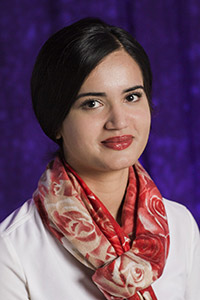Hopes to Strengthen Health Systems, Improve Health Care Delivery
Sanjit Kaur wasn't sure she'd be accepted by the University of Washington. After all, she knew a high school valedictorian who was put on the waiting list.

So Kaur didn't even bother applying. Instead, she enrolled at Seattle Central, a community college where she maintained a 3.97 grade point average over two years.
By then, Kaur had enough confidence to transfer. "The UW was the only college I applied to. It's a really venerated public institution," she said. "It's the Harvard equivalent in Washington."
Kaur made the Dean's List every quarter at the UW, and was recently named one of two graduating seniors to receive the UW President's Medal for outstanding academic performance. The other is Sara Kathryn Leonetti, a double-major in history and philosophy. Interim President Ana Mari Cauce broke the news in a telephone call.
"I was shaking," Kaur said. "It's an honor to have the president call you."
At first, Kaur kept the news to herself."“I didn't want to tell anybody because I actually didn't believe it myself!" she said, laughing. "What if they change their mind and I've told everybody?"
Kaur is the second School of Public Health undergraduate to rank at the top of her class. Junior Ashley Bobman was honored earlier this year as winner of the UW Sophomore President's Medal.
"What I really like about the School of Public Health is that it values social justice and pursuing equity. That really spoke to me," Kaur said. "I love the classes, the professors – a lot of them are working in the field and they share their research. It's also hands-on experience, and you get to work with a lot of diverse communities."
Her own practical experience came at the Bailey-Boushay House, which offers programs for people with HIV. As part of her required capstone project, Kaur, who is minoring in Nutritional Sciences, worked on food security issues – making sure patients get three nutritious meals a day. She plans to continue volunteering after graduation.
Another pivotal experience came after Kaur's freshman year, in a summer internship in Jalandhar, India. There she gained experience on improving access to health care among the "untouchables," members of India's lowest caste.
It made her realize that strengthening health systems, rather than just working individually with people, could be more effective in bringing about change. "You get the chance to improve more lives and more communities," Kaur said.
Kaur also volunteered for a non-profit called One By One in Ballard, where she taught basic global health and advocacy skills to local high school students.
Beginning in August, Kaur will begin a year-long assignment with Seattle's Neighborcare Health, working as a health resource specialist.
Her advice? Choose a major you're passionate about. And make time to get involved with community organizations, she says. It helps you figure out what you want to do, and what you're capable of. "One thing I've learned is to stop self-doubting myself," Kaur said.
It's not always hard work at the top of a class. For fun, Kaur loves yoga, eating Punjabi food with her family, and shopping, especially for cosmetics. "I don't have a savings account, thanks to Sephora," she said.
